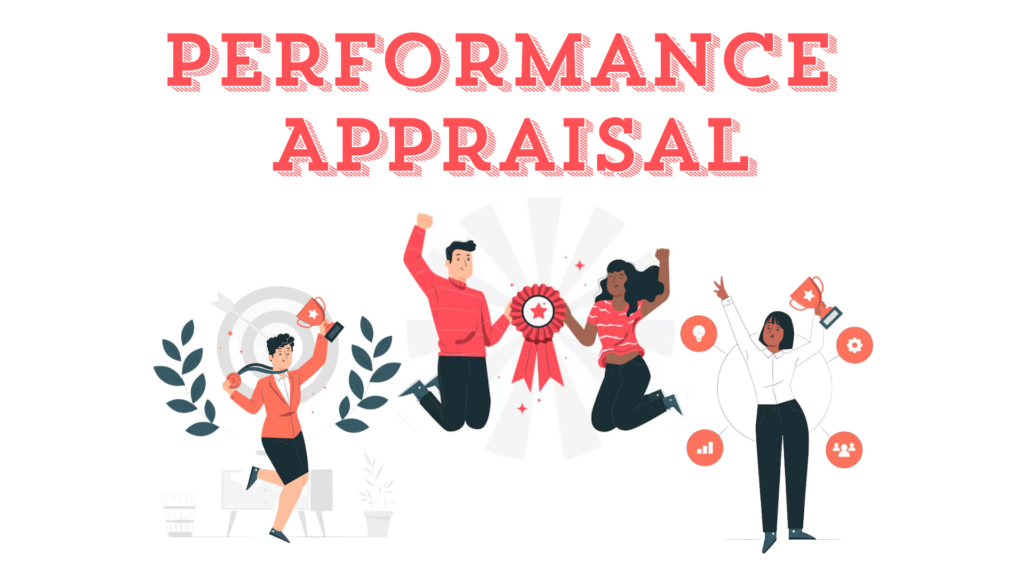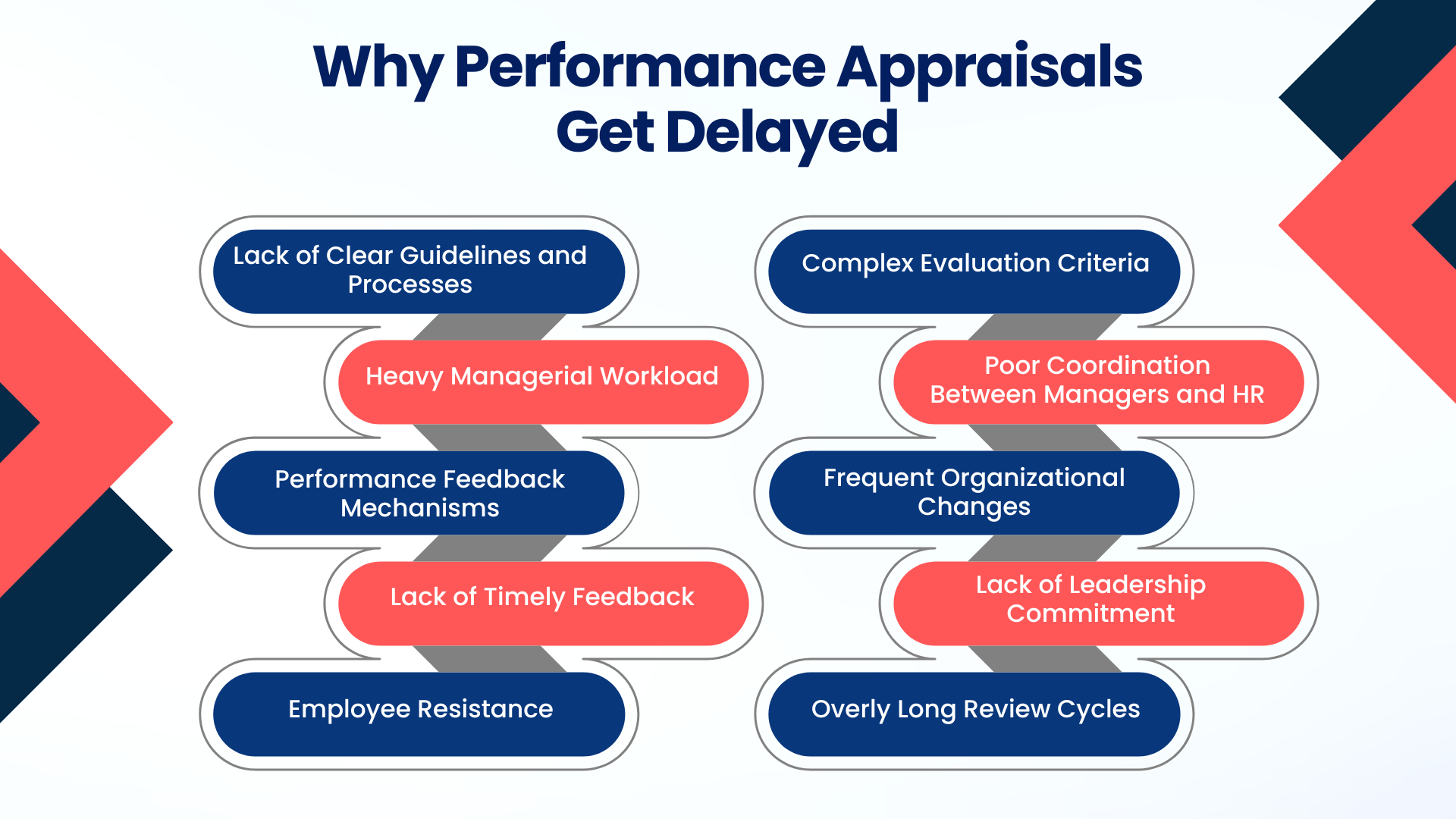Performance appraisals are one of the key approaches to performance management as they provide employers with a means of judging their subordinates, defining new objectives, and encouraging development. In this blog, we’ll discuss the 10 most typical causes of these delays, how they can be addressed, and how technology can help with the help of Kredily’s HRMS.
What do we mean by Performance Appraisal?
A performance appraisal is a formal, systematic review of an employee’s work during a certain period of time and is carried out by the immediate superior of the employee. It deals with determining how effectively an employee performs his or her assigned tasks and whether the individual or the collective delivers on set goals, as well as evaluates abilities, inefficiencies, and potential for development.
The process typically includes:
- Employee Performance Review: A formal review of the employee’s work.
- Employee Evaluation: An in-depth analysis of employee competencies, skills, and goal achievement.
- Performance Review: A dialogue between the manager and employee that involves feedback and setting future goals.
- Employee Assessment: Measuring employee performance against set criteria.
- Performance Feedback: Providing constructive feedback to improve or sustain employee performance.
Performance appraisals play a vital role in shaping an organization’s talent development strategy and ensuring employees are aligned with company goals.
10 Common Reasons Why Performance Appraisals Get Delayed
Now that we understand the objective and significance of performance appraisals and how to assess performance, it is about time that we learned why this important process often slows down and what should be done to address this issue.
1. Lack of Clear Guidelines and Processes
The lack of clearly defined processes is said to be a main cause of untimely performance appraisals. In organizations where there is no clear set template in terms of performance appraisal, managers may not know when or how actual evaluations should be done. Implementing a robust Performance Management System can provide structured processes and templates, ensuring timely and effective evaluations.
How to Fix It: Suggest you adopt an HRMS such as Kredily to have outlined procedures and timelines on performance appraisals, including automated alerts to ensure all stakeholders know the timelines and processes.
2. Heavy Managerial Workload
Managers have too many task demands, and the process of performance appraisals can sometimes take the backseat. This results in rack time and, especially if the appraisals are lengthy and demanding, probably with many comprehensive assessments of the employees. Modern managers often juggle multiple responsibilities, making employee assessment a lower priority.
How to Fix It: An HRMS can help in performance evaluation and give the manager immediate feedback on the performance of the subordinate, and also produce performance reports. What we find with Kredily is that managers can allow the system to manage basic processes like performance tracking and so on.
3. Performance Feedback Mechanisms
Many companies rely on once- or twice-yearly performance reviews, often overlooking consistent employee performance tracking throughout the year. This causes delays, last-minute data scrambles, and rushed evaluations, reducing feedback quality.
How to Fix It:.
Adopt continuous performance monitoring to ensure ongoing documentation. Tools like Kredily’s performance management system empower managers to track employee progress year-round, streamlining appraisals and delivering timely, meaningful feedback aligned with organizational goals.
4. Lack of Timely Feedback
When performance feedback is not frequent, appraisals are difficult in that managers only have the information regarding the performance given by the employees months ago. It can literally take a lot of time before the appraisal process is concluded.
How to Fix It: Start conducting a regular performance appraisal by implementing HRMS software called Kredily. The use of ongoing feedback means that both praise and criticism are documented in real-time and, therefore, more effective appraisal
5. Employee Resistance
Employees sometimes view performance appraisals with apprehension or negativity. This resistance can cause delays as employees may not engage fully with the process or managers may avoid uncomfortable conversations.
How to Fix It: One way of reversing this is to ensure that there is a clear, open and engaged agreement on how the appraisal is to be done. Self- and 360-degree assessments that occur with the help of Kredily can be viewed as least intrusive and eliciting as little fear as possible.
6. Complex Evaluation Criteria
Complicated or vague performance measurement standards may slow down the performance appraisal process because managers have to spend considerable time figuring out how to apply them to every single worker. Overly complicated employee evaluation forms can discourage timely completion.
How to Fix It: Make it easier to appraise employees by applying the ready-made templates that are provided by Kredily. Thus, it is possible to state that in this way the criteria are clear, non-judgmental, and oriented towards organizational objectives.
7. Poor Coordination Between Managers and HR
Usually, performance appraisals involve cooperation between HR professionals and managers. Conflict of interest between these two groups can lead to a lengthy review time of reviewing because the manager is likely to withhold the necessary documents or reports.
How to Fix It: The material also highlights that the Kredily platform can facilitate better cooperation between the HR department and the managers. Push notifications and mutual KPI boards mean that both partners are aware of the situation and face no unexpected situations.
8. Frequent Organizational Changes
Due to organizational change in the form of restructuring or mergers, performance appraisals may be removed from the organizational agenda and even when included, it can be done many times later than intended.
How to Fix It: Kredily’s HRMS is also change-friendly through flexible performer management tools for organizations to easily continue with their appraisals especially during change.
9. Lack of Leadership Commitment
Lack of focus on optimize performance management by leadership makes some managers ignore appraisals, thus creating a form of delay.
How to Fix It: It has clearly demonstrated that performance management is an area requiring active involvement of leadership. Kredily’s HRMS gives performance analytics that offer reports for leaders for the appraisal and appraisal process as a corporate mandate.
10. Overly Long Review Cycles
In some organizations, the appraisal can take a very long time, for instance, an annual process, and this will make it easy for the managers to neglect this process. Unfortunately, when appraisals are only carried out annually, the tool ends up being completed and sometimes locked away for a year
How to Fix It: It is however preferable to have it on a continuous basis or on a quarterly basis. With Kredily, organisations can move from the traditional once-a-year-review to more frequent performance feedback sessions, which can greatly help keep people on-track and cuts down on potential slippage.
How to Measure a Performance Management System
There are different kinds of performance appraisals, all of which have varied uses for evaluating employee performance. Through our sophisticated software, Kredily’s HRMS enables organizations to integrate and apply one or many forms of appraisals into corporate practice as and when required. Here are the common types:
1. 360-Degree Feedback Appraisal: This method involves seeking feedback from all sides – managerial, from colleagues and friends, from juniors and seniors, and customers included. It gives an overall picture of the employee and his work, what makes him or her special, and what strengths or lacks can be improved.
2. Self-Assessment: Self-appraisal appraisal is where the employees rate themselves. This fosters responsibility, growth, and maturity within the relevant individuals.
3. MBO stands for Management by Objectives: Thus, discussions in MBO appraisals are more goal-oriented, as well as individual targets established in regard to organisational goals and objectives. The annual performance of the employees is evaluated through the achievement of Key Result Areas (KRAs).
4. Rating Scale Appraisal: Performance measures are usually checked on employee with a certain scale assigned to the various parameters to base the rating in. This type is quite common, simple to implement, and uses quantitative data and information.
5. Behaviorally Anchored Rating Scale (BARS): BARS combines elements of both qualitative and quantitative approaches. It rates employee behavior based on specific examples linked to job-related skills.
6. Peer Review: In Peer reviews, employees offer their outlook on others within the organization. This method is effective because it allows evaluation of aspects such as teamwork, communication, and collaboration.
Maximize Performance with Kredily
Timely performance appraisals are crucial for organizational success. No matter which type of appraisal suits your business, Kredily’s HRMS offers the flexibility to customize the process, ensuring accurate assessments and fostering a culture of growth. Try Kredily’s performance management tools for free and transform the way you evaluate employee performance.
Conclusion
Leveraging these components, along with advanced tools like Kredily’s HRMS, will allow organizations to streamline performance reviews, ensure continuous improvement, and prevent delays in the appraisal process.
By integrating these measurement techniques into your performance management system, you can foster a more productive and engaged workforce, enhance employee development, and align individual performance with your organization’s long-term goals.
Timely performance appraisals are crucial for organizational success. By understanding and addressing common delays, implementing modern solutions like Kredily, and following best practices, organizations can transform their performance management processes into strategic assets.



